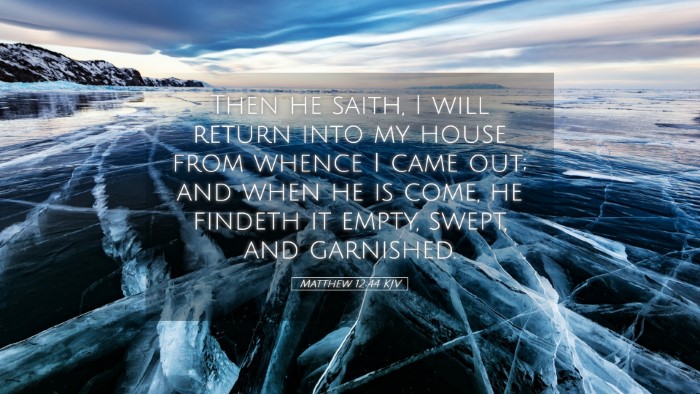Commentary on Matthew 12:44
In Matthew 12:44, we find a compelling verse that addresses the spiritual condition of the heart and the dangers of superficial repentance and the unclean spirit's return. This verse is a part of Jesus' teaching concerning the nature of true deliverance and the necessity of ongoing spiritual vigilance.
Text of Matthew 12:44
"Then he says, 'I will return to my house from which I came.' And when he comes he finds it empty, swept, and put in order."
Contextual Analysis
This verse must be understood in the context of Jesus' discourse about the nature of evil spirits and the life of individuals who have been delivered from demonic possession. Jesus emphasizes the importance of not only being freed from an unclean spirit but also filling one's life with righteousness to prevent the return of that spirit.
Spiritual Application
- The Unclean Spirit's Nature: The term "unclean spirit" refers to demonic influences, which seek to take residence in the lives of individuals. The character of these spirits is not only to inhabit but to bring chaos and destruction.
- Empty and Swept: The imagery of a house that is empty, swept, and put in order represents a state of apparent cleanliness and orderliness, yet it lacks true substance. This reflects the danger of a life that has been morally reformed, yet spiritually vacant.
Insights from Matthew Henry
Matthew Henry emphasizes the vanity of merely sweeping one's house if it is not occupied by something or someone worthy. He notes that the deliverance from sin is not merely about refraining from sin but about actively pursuing holiness and righteousness. The absence of a filling, according to Henry, invites greater danger, as the unclean spirit may return with reinforcements.
Insights from Adam Clarke
Adam Clarke elaborates on the concept of homes being “swept and garnished.” He points out that spiritual reformation without true conversion is futile. He warns that while one may clean up their life and rid themselves of visible sin, unless the heart is changed and filled with the Spirit of God, the potential for relapse is significant. Clarke stresses the necessity of spiritual vigilance, suggesting proactive measures such as prayer, the study of Scripture, and a community of faith in order to keep the house occupied by the Holy Spirit.
Insights from Albert Barnes
Albert Barnes focuses on the theological implications of this passage. He argues that the "house" in this verse can also symbolize the human heart. He reflects on the importance of not only dismissing evil but also welcoming divine grace to fill the void left behind. Barnes states that merely getting rid of bad influences is insufficient; a true transformation of character and continual dependence on God is essential for protection against returning evil influences.
Theological Implications
This verse illustrates a profound truth about the Christian life: maintaining spiritual integrity requires vigilance, engagement, and proactive filling of our lives with God’s truth and presence. It serves as a caution against complacency in one's spiritual journey.
Practical Considerations
- Continuous Renewal: Believers are called to continually renew their minds and spirits through prayer, worship, and the Word. This renewal acts as a safeguard against spiritual desolation.
- Holistic Transformation: It is not enough to rid oneself of sin; one must actively seek the presence of God that brings about real change in character and behavior.
- Spiritual Accountability: Engaging with a community of believers can offer support and accountability, crucial for maintaining one’s spiritual fervor and diligence.
Conclusion
Matthew 12:44 serves as a poignant reminder for all believers to take their spiritual life seriously. It encourages a transformational perspective that goes beyond mere external compliance to a profound inner change and a commitment to filling the 'house' of one's heart with the good and the holy. The diligent Christian is one who does not merely remove sin but proactively invites God’s spirit to reside fully within.


